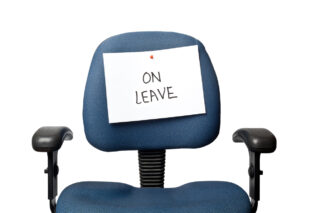Seyfarth Synopsis: When must an employer provide leave time in addition to FMLA/CFRA-type leave as a reasonable accommodation? The answer to that question, as with many other leave-related questions, may depend on your location on the map.
 Remember that early TV sitcom “Leave It To Beaver,” starring Jerry Mathers as the Beaver? “The Beave” constantly got into trouble and vented his righteous indignation at seemingly arbitrary parental authority. California employers might relate when they try to understand when to grant additional leave to employees failing to return from various protected leaves. Employers can find themselves exasperated by sometimes arbitrary-seeming rules for reasonable accommodation.
Remember that early TV sitcom “Leave It To Beaver,” starring Jerry Mathers as the Beaver? “The Beave” constantly got into trouble and vented his righteous indignation at seemingly arbitrary parental authority. California employers might relate when they try to understand when to grant additional leave to employees failing to return from various protected leaves. Employers can find themselves exasperated by sometimes arbitrary-seeming rules for reasonable accommodation.
“Swell” in the Seventh Circuit
Outside of California, courts have imposed limits on leaves that extend beyond the specific leaves mandated by statute. Take the Seventh Circuit decision in Severson v. Heartland, which held that an employer granting a reasonable accommodation under the Americans with Disabilities Act (ADA) need not grant leave of more than a few weeks beyond an FMLA leave. Part of the rationale for this decision was that requiring employers to provide significant leave beyond an FMLA leave would convert the ADA to a medical leave entitlement statute (see our detailed blog on the decision here). The U.S. Supreme Court has declined to review Severson.
Severson reflects an interpretation of the ADA that would limit the leave employees would be entitled to in ADA-only jurisdictions.
“Gee Whiz” in California
Within California, courts have approached the issue differently. What should an employer do when an employee has used all mandated leave time? In California, the employer may be required to grant substantially more leave, as a matter of reasonable accommodation.
In Sanchez v. Swissport, Inc. (2013), the appellate court held that where an employee had exhausted her allotted leave under the California Family Rights Act (CFRA) and Pregnancy Disability Leave Law (PDL), the employer had to continue an employee’s leave as a reasonable accommodation under the Fair Employment and Housing Act (FEHA).
Likewise, in Gardner v. Federal Express Corp. (2015), where a driver on leave for a work injury had exhausted his 90-day leave, a federal district court denied summary judgment to the employer on a FEHA claim where a question of fact existed as to whether additional leave would have been a reasonable accommodation.
In deciding if continued leave would be a reasonable accommodation, courts look at whether the leave appears finite, and whether the employee could return to perform essential job functions at the end of the requested leave. Unfortunately, this analysis can pose factual problems for even the most cautious employer, as it can be obscure when (or if) an employee is likely to return.
Be-very Cautious Going Forward
Luckily, there are some limits to extended leave requirements, even in California.
In one leading case, Hanson v. Lucky Stores, Inc. (1999), the Court of Appeal made clear that after an employee’s protected leave entitlement has expired, “a finite leave can be a reasonable accommodation under FEHA, provided it is likely that at the end of the leave, the employee would be able to perform his or her duties.” The Court of Appeal further noted that a “reasonable accommodation does not require an employer to wait indefinitely for an employee’s medical condition to be corrected.”
So there is a limit to how much leave an employer must provide beyond CFRA, FMLA, or PDL-related leaves. Unfortunately, exactly how long the employee can remain off work depends on the specific circumstances. Case law indicates that courts will look to the particular aspects of the business, difficulties in maintaining the employee’s position, and the general outlook of the employee’s ability to return to the position.
In one recent decision, Markowitz v. UPS (2018), the Ninth Circuit upheld summary judgment for an employer, holding that accommodating an employee for twelve months of leave after she had exhausted FMLA leave was reasonable, under the specific circumstances of that particular case.
Workplace Solution: Even though there are limits, the amount of time a California employer must grant FEHA leave in excess of other statutory entitlements is in the gray area of “reasonable accommodation.” Our suggestion is that employers tread cautiously, proceed step by step, evaluate developments as they occur, and consult with counsel at each fork in the road.
Edited by Coby Turner